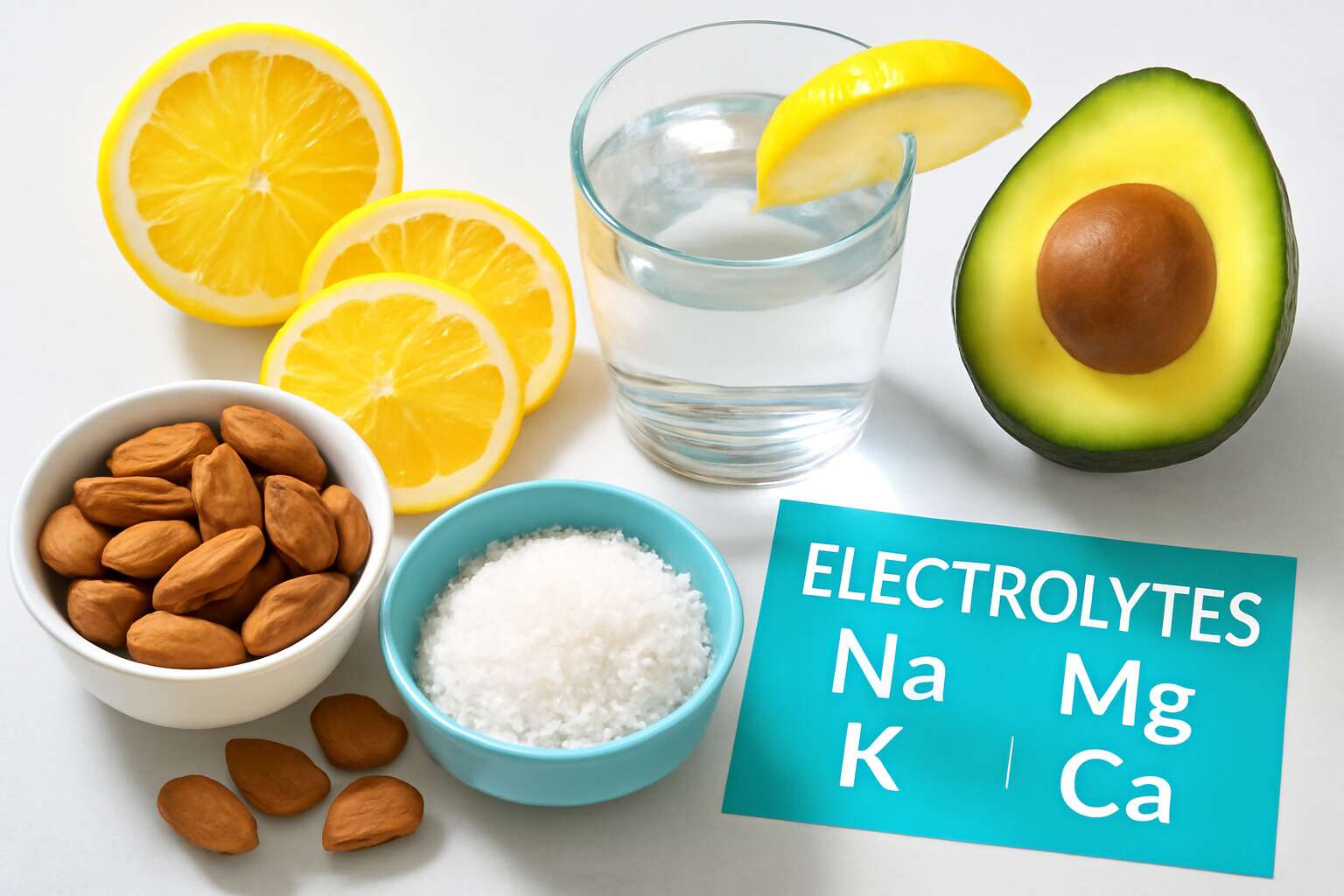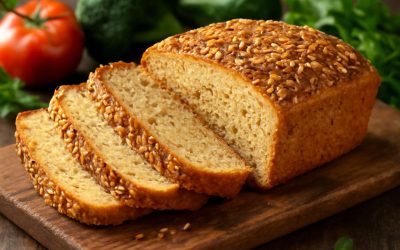Understanding Electrolytes and Their Role in Low Carb Diets
What Are Electrolytes?
Electrolytes are the unsung heroes of any low carb diet electrolytes game plan—those tiny charged particles that keep our bodies humming along smoothly. Think of them as the body’s internal Wi-Fi, transmitting vital signals to keep muscles flexing and brains clicking. Without enough electrolytes, you might find yourself battling fatigue, muscle cramps, or even a headache that feels like a personal vendetta. It’s no exaggeration to say they’re the silent partners in your low carb diet electrolytes journey, ensuring every cell functions as it should.
In fact, during a low carb diet electrolytes shift, your body flushes out more water and, with it, essential minerals like sodium, potassium, magnesium, and calcium. This imbalance can turn a promising dietary adventure into a cramp-filled nightmare. To avoid this, many savvy low carb enthusiasts keep a mental checklist of these critical electrolytes:
- Sodium
- Potassium
- Magnesium
- Calcium
Mastering the art of maintaining proper electrolyte levels isn’t just about avoiding cramps. It’s about optimizing your low carb diet electrolytes to keep energy levels high, mental clarity sharp, and overall wellbeing intact. After all, what’s the point of shedding pounds if your muscles are throwing a tantrum every time you stand up?
Importance of Electrolytes in the Body
Electrolytes are the silent architects of vitality within the human body, especially vital when navigating the terrain of a low carb diet electrolytes. These charged particles—sodium, potassium, magnesium, and calcium—serve as the custodians of equilibrium, orchestrating a delicate balance that keeps us energized and alert. When you embark on a low carb diet, your body’s natural balance shifts, often leading to increased water loss. This phenomenon, while beneficial for weight loss, can inadvertently drain essential electrolytes, leaving you feeling drained or unsteady.
The importance of electrolytes in the body cannot be overstated. They are the catalysts behind nerve transmission, muscle contraction, and fluid regulation—each a vital thread in the tapestry of health. During a low carb diet electrolytes play a starring role, ensuring that your muscles don’t cramp at the worst possible moment or that your mental clarity stays razor-sharp. To keep these elements in harmony, many health-conscious individuals monitor their intake, sometimes even tracking specific mineral levels to prevent imbalances that could sabotage their progress.
Why Electrolytes Are Critical for Low Carb Dieters
Understanding electrolytes and their role in low carb diet electrolytes isn’t just for science nerds; it’s a game-changer for anyone committed to keto or low carbohydrate lifestyles. When carbs are cut, your body’s water retention plummets, and with it, vital electrolytes like sodium, potassium, magnesium, and calcium. This electrolyte depletion can leave you feeling sluggish, with muscle cramps or brain fog making surprise guest appearances. It’s almost like your body’s trying to remind you that electrolytes are the unsung heroes of low carb diet electrolytes.
To keep your energy levels soaring and avoid the dreaded “keto flu,” understanding the importance of these minerals is essential. They don’t just keep your muscles firing and nerves transmitting—they also help maintain fluid balance, which is critical when your body is going through carbohydrate withdrawal. In fact, many low carb dieters find that monitoring their electrolyte intake is the secret to thriving on a reduced-carb plan, rather than merely surviving it.
For those venturing further into the world of low carb diet electrolytes, consider this: the balance isn’t just about eating more salt. It’s about a nuanced approach—ensuring your body gets the right amount of each mineral. Here’s a quick rundown:
- Sodium: Keeps your blood pressure in check and prevents dehydration.
- Potassium: Supports muscle function and helps balance out sodium’s effects.
- Magnesium: Essential for hundreds of enzymatic reactions, including energy production.
- Calcium: Not just for strong bones, but also crucial for nerve signaling and muscle contraction.
In South Africa’s hot climate, maintaining these electrolytes becomes even more vital. Whether it’s through diet, supplements, or mineral-rich foods, mastering the art of low carb diet electrolytes is key to thriving rather than merely enduring your dietary shift. After all, when your electrolyte game is on point, the only cramps you’ll experience are from laughing too hard at your own keto jokes!
Key Electrolytes in Low Carb Nutrition
Sodium: The Balance of Fluid and Blood Pressure
Sodium, the reigning monarch of low carb diet electrolytes, does more than just make your chips salty—it’s the secret sauce to maintaining fluid balance and keeping blood pressure in check. When carbs take a nosedive, your body’s sodium levels often do a disappearing act, leading to dizziness, headaches, and a sense that your brain is auditioning for a role in a foggy film noir.
Think of sodium as the conductor of your body’s symphony, ensuring every electrolyte plays in harmony. Without enough sodium, your body struggles to regulate blood volume, which can send your blood pressure on a rollercoaster ride—preferably not the terrifying kind. To keep things steady, many low carb dieters find that supplementing with sodium-rich foods like seaweed or adding a pinch of Himalayan salt to their water can be a game changer.
In fact, the balance of sodium in a low carb diet electrolytes regimen can be simplified into a quick checklist:
- Maintain adequate sodium intake
- Monitor for signs of imbalance like cramping or fatigue
- Adjust salt levels based on activity and climate—especially important in South Africa’s hot weather!
Potassium: Muscle Function and Heart Health
While sodium often steals the spotlight in low carb diet electrolytes, potassium remains the silent guardian of your muscle function and heart health. This essential mineral acts as a vital conductor, ensuring your muscles contract smoothly and your heart rhythm stays steady—crucial when carbs are sharply reduced. Without sufficient potassium, you might experience the unsettling sensation of muscle cramps or irregular heartbeats, both warning signs of imbalance lurking beneath the surface.
In the context of low carb diets, maintaining optimal potassium levels can be a game changer. Foods rich in potassium, such as avocados, leafy greens, and nuts, can help fill this gap naturally. For those in South Africa, incorporating local staples like sweet potatoes and bananas can also bolster potassium intake. Monitoring your electrolyte balance isn’t just about avoiding discomfort—it’s about safeguarding your core functions amidst dietary shifts.
- Ensure your dietary choices include potassium-rich foods
- Watch for signs of deficiency like muscle weakness or fatigue
- Adjust intake based on activity level and climate, especially in hot weather
Magnesium: The Chill Mineral for Stress and Sleep
Magnesium, often dubbed the “chill mineral,” is the unsung hero of low carb diet electrolytes. While sodium and potassium hog the spotlight, magnesium quietly works behind the scenes to regulate stress levels and promote restful sleep—an often overlooked benefit for those navigating the carb-reduced wilderness. It’s the sort of mineral that turns your restless nights into peaceful slumber, making mornings less of a zombie apocalypse.
In the realm of low carb diet electrolytes, magnesium’s importance cannot be overstated. It helps relax muscles, curbing the dreaded cramps that tend to rear their ugly heads when carb intake drops sharply. For those living in South Africa, local foods like nuts, seeds, and dark leafy greens are treasure troves of magnesium. Incorporating these into your diet ensures your electrolyte balance remains in check—because who wants to wake up feeling like they’ve been hit by a truck?
To keep your magnesium levels optimal, consider adding a supplement or consciously snacking on magnesium-rich foods. After all, your body’s stress response and sleep quality depend heavily on this silent guardian of low carb diet electrolytes. When magnesium is in harmony with the other electrolytes, your body can truly thrive—even without the carbs to keep energy levels in check!
Calcium: Bone Strength and Nerve Transmission
Calcium, often recognized as the cornerstone of skeletal integrity, plays a vital role beyond mere bone strength in the realm of low carb diet electrolytes. Its influence extends into nerve transmission, where it acts as a silent conductor, ensuring signals travel seamlessly through the nervous system. This mineral fosters not only physical stability but also a mental clarity that can often feel elusive during restrictive diets.
In the context of low carb diet electrolytes, calcium’s significance deepens. When carbohydrate intake drops, maintaining adequate calcium levels becomes crucial to prevent muscle cramps and support optimal nerve function. South African diets, rich in dairy, dark leafy greens, and small fish, naturally supply this essential mineral, bolstering your electrolyte balance.
- Bone density preservation
- Nerve impulse transmission
- Muscle contraction and relaxation
As with other electrolytes, a fine balance of calcium ensures that your body functions harmoniously, even in the face of dietary restrictions. Its role is subtle yet profound—a vital thread in the intricate tapestry of low carb diet electrolytes that keeps your health resilient and your mind sharp.
Electrolyte Imbalance and Low Carb Diet Challenges
Common Symptoms of Electrolyte Imbalance
Electrolyte imbalance can turn a low carb diet into a rollercoaster ride—minus the fun. When your body craves those essential minerals but isn’t getting enough, chaos ensues. Many low carb dieters report symptoms like muscle cramps, fatigue, and dizziness—red flags that your electrolytes are throwing a tantrum. It’s as if your body’s internal chemistry is playing hide and seek with vital nutrients, leaving you feeling less than stellar.
Common symptoms of electrolyte imbalance include headaches, irritability, and irregular heartbeat. These subtle yet insidious signs often sneak up when you least expect them, especially during the early phases of a low carb diet. Staying vigilant is key because neglecting low carb diet electrolytes can lead to dehydration and even more severe health issues. Ensuring you maintain proper electrolyte levels isn’t just about avoiding discomfort—it’s about keeping your body running smoothly on this dietary journey.
Why Low Carb Diets Can Lead to Electrolyte Deficiencies
Embarking on a low carb diet can feel like walking a tightrope—balancing the desire for weight loss with the body’s delicate electrolyte equilibrium. As carbohydrate intake diminishes, so do the stored glycogen levels, which are intimately tied to water retention and electrolyte balance. Without careful attention, this shift can trigger a cascade of imbalances that undermine both energy and well-being.
Electrolyte deficiencies are a common challenge faced by low carb dieters, often manifesting as muscle cramps, fatigue, or even mood swings. These symptoms are subtle whispers from your body, warning of an internal discord that, if ignored, can escalate into dehydration or more severe health issues. The intricate dance of minerals like sodium, potassium, magnesium, and calcium becomes even more critical during this dietary transition, as their levels are closely intertwined with the metabolic adjustments you’re making.
Understanding the nuances of low carb diet electrolytes and their role in maintaining optimal health can transform a challenging journey into a sustainable lifestyle. Recognizing the signs early and ensuring proper mineral intake is essential for those seeking harmony between their diet and their body’s natural rhythms.
Risks Associated with Imbalanced Electrolytes
Electrolyte imbalance lurks as a stealthy adversary on the low carb diet journey, often manifesting as subtle yet insistent signals from the body. When carbohydrate intake plummets, the delicate mineral harmony shifts, risking dehydration and systemic disarray. These imbalances can trigger a cascade of challenges—muscle cramps, persistent fatigue, and emotional turbulence—that threaten to derail even the most determined dieters.
In the labyrinth of low carb diet electrolytes, the risks extend beyond discomfort. Severe deficiencies, if unaddressed, can compromise cardiovascular health, impair cognitive function, and weaken immune defenses. Recognizing the signs early is akin to deciphering an internal Morse code—each symptom a vital clue. The intricate interplay of sodium, potassium, magnesium, and calcium becomes paramount, underscoring the importance of vigilant mineral management during this dietary shift.
- Disrupted hydration levels
- Muscle weakness and spasms
- Altered mental clarity and mood swings
Understanding the nuances of low carb diet electrolytes is not merely academic; it’s a safeguard against the insidious risks associated with imbalanced electrolytes. As the body adapts, maintaining this mineral equilibrium becomes a cornerstone of sustainable success—because neglecting these vital elements can turn a promising low carb lifestyle into a perilous tightrope walk.
How to Maintain Electrolyte Balance on a Low Carb Diet
Dietary Sources Rich in Electrolytes
Maintaining electrolyte balance on a low carb diet is an art as much as it is a science. The shift away from carbohydrate-rich foods can lead to a swift depletion of essential electrolytes, making it vital to incorporate dietary sources that replenish these vital minerals. Rich in potassium, avocados and leafy greens serve as natural allies, supporting muscle function and heart health. For magnesium, nuts and seeds are not only delicious but also indispensable in soothing nerves and promoting restful sleep. Ensuring a steady intake of these nutrients helps to prevent symptoms such as fatigue and muscle cramps, which often accompany electrolyte imbalances.
In South Africa, incorporating local produce like spinach, pumpkin seeds, and bananas can elevate your low carb diet electrolytes intake effortlessly. An elegant approach involves creating a vibrant salad or smoothie that highlights these ingredients, blending health with culinary pleasure. After all, achieving harmony within the body’s electrolyte symphony isn’t merely about supplementation—it’s about embracing the rich tapestry of natural, wholesome foods that sustain vitality and well-being.
Electrolyte Supplements
Maintaining electrolyte balance on a low carb diet electrolytes is akin to orchestrating a delicate ballet—each step must be precise, yet fluid. While food sources lay the foundation, many dieters turn to electrolyte supplements to bridge the gap when dietary intake falls short. These supplements, often available in powder or capsule form, offer a quick, reliable boost without the fuss of meal planning. They’re especially handy after a vigorous workout or during a hot South African summer, where sweat loss can rapidly deplete essential minerals.
For those who prefer a natural approach, incorporating electrolyte-rich drinks—think coconut water or specially formulated mineral waters—can seamlessly enhance your low carb diet electrolytes. When choosing supplements, look for ones containing sodium, potassium, magnesium, and calcium, as these are the pillars of electrolyte harmony. Remember, moderation is key; over-supplementing can tip the scales toward imbalance, undermining the very health goals you seek to achieve. In this delicate dance, supplements are your allies, but the real maestros are the wholesome foods that naturally support your electrolyte symphony.
Hydration Strategies
Maintaining optimal hydration on a low carb diet electrolytes isn’t just about chugging water; it’s about creating a harmonious internal symphony. When your body shifts into fat-burning mode, it often sheds water and vital minerals, making electrolyte balance a delicate act. To stay in tune, consider incorporating hydration strategies that emphasize electrolyte-rich fluids. Coconut water, infused with natural minerals, can be a gentle yet powerful ally in replenishing lost electrolytes. Additionally, mineral waters fortified with magnesium and calcium serve as a natural boost for your low carb diet electrolytes.
For those who prefer a more structured approach, an ordered routine can ensure your electrolytes stay balanced. Here’s a simple method:
- Start your day with an electrolyte-enhanced drink or mineral water.
- Drink consistently throughout the day, especially after workouts or on hot days.
- Incorporate electrolyte powders or capsules if needed, but always with moderation.
Remember, hydration isn’t merely about quantity; it’s about quality and timing. Listening to your body’s signals and adjusting your intake accordingly will help you maintain the vital electrolyte balance necessary for a successful low carb journey. This way, your body remains energized and resilient, ready to conquer every adventure in your health voyage.
Monitoring and Adjusting Electrolyte Intake
Signs You Need to Increase Your Electrolytes
Monitoring your electrolyte levels becomes essential when following a low carb diet electrolytes. As your body adapts to reduced carbohydrate intake, it may shed vital minerals faster, leading to imbalances that can cause fatigue, muscle cramps, or dizziness. Paying close attention to these signs allows you to fine-tune your intake and prevent discomfort.
If you notice persistent muscle weakness, irregular heartbeat, or a sense of profound exhaustion, these could be indicators that your electrolyte levels need boosting. Sometimes, simply adjusting your diet or supplement routine can make a significant difference. Remember, the body’s signals are subtle but powerful.
Incorporating a simple self-assessment, like tracking symptoms or using home testing kits, can help you stay ahead of deficiencies. For those who thrive on a low carb diet electrolytes, staying vigilant is the key to maintaining balance and ensuring your journey remains sustainable and healthful.
When to Consult a Healthcare Professional
Monitoring your electrolyte levels becomes an essential act of vigilance when navigating the shadowy depths of a low carb diet electrolytes. As your body sheds its carbohydrate bindings, subtle disturbances in mineral harmony may emerge—dizziness, muscle cramps, or a haze of fatigue that whispers of imbalance. Recognizing these signs early is crucial, for they are the body’s silent screams for correction.
While minor adjustments in diet or supplement routines often suffice to restore equilibrium, there are moments when professional guidance becomes paramount. If persistent muscle weakness, irregular heartbeat, or overwhelming exhaustion haunt your days, consulting a healthcare professional is no longer optional but a necessity. They can perform targeted tests to reveal hidden deficiencies and guide precise interventions.
- Track symptoms methodically—keep a journal of your body’s signals.
- Utilize home testing kits if available, for insights into your electrolyte status.
- Seek medical counsel if symptoms escalate or resist self-correction, ensuring your low carb journey remains safe and sustainable.
In the shadows of a low carb diet electrolytes, vigilance is your most trusted ally. Only through careful monitoring and timely adjustment can you sustain the delicate balance that keeps vitality alive in the silent, relentless march of your metabolic transformation.
Tools and Tests to Check Electrolyte Levels
Monitoring your electrolyte levels is a crucial step in mastering a low carb diet electrolytes. As your body adapts to a lower carbohydrate intake, shifts in mineral balance can occur unexpectedly. Fortunately, there are effective tools and tests to keep you informed and in control. Home testing kits, for instance, have become increasingly sophisticated, offering quick insights into your electrolyte status without the need for a clinical visit. These devices can measure key minerals like sodium, potassium, magnesium, and calcium, providing real-time data to guide your dietary adjustments.
For more precision, healthcare professionals can perform blood tests that reveal subtle deficiencies before symptoms even surface. If you suspect an imbalance, consider tracking your symptoms alongside these tests. Keeping a detailed journal allows you to correlate physical signs, such as muscle cramps or fatigue, with your electrolyte levels, helping you fine-tune your low carb diet electrolytes intake effectively.
- Use reliable home testing kits to regularly check electrolytes.
- Consult healthcare professionals for comprehensive blood tests if symptoms persist.
- Maintain a symptom journal to spot patterns and trigger points.
When combined, these tools and tests form a robust system to safeguard your vitality on a low carb diet. Staying vigilant ensures you can promptly address imbalances and sustain your health through this metabolic journey. Remember, the right monitoring not only prevents complications but also unlocks the full potential of your low carb lifestyle.
Myths and Facts About Electrolytes on a Low Carb Diet
Common Misconceptions
In the realm of low carb diet electrolytes, myths often obscure the path to optimal health. A prevalent misconception is that electrolyte imbalances are solely a concern for athletes or those with severe dehydration. However, the truth is more nuanced: even moderate dietary shifts on a low carb diet can disrupt these vital mineral balances, leading to fatigue, muscle cramps, and neurological fog. Many believe that simply increasing water intake suffices, but neglecting the delicate interplay of sodium, potassium, magnesium, and calcium can exacerbate deficiencies.
One common misconception is that all electrolyte supplements are created equal. This is far from reality. The effectiveness of low carb diet electrolytes hinges on choosing formulations that mirror the body’s natural mineral ratios. For instance, an unbalanced supplement can inadvertently worsen symptoms rather than alleviate them. Recognizing that electrolyte needs fluctuate based on individual factors and diet composition is crucial—what works for one person might not suit another. Dispelling these myths paves the way for a more informed, balanced approach to maintaining electrolytic harmony.
Fact-Checking Electrolyte Myths
Myths and facts about electrolytes on a low carb diet often dance in shadows, confusing even the most seasoned dieters. Many believe that electrolyte imbalances are only a concern for athletes or those caught in the grip of severe dehydration. Yet, the truth whispers a darker tale—moderate dietary shifts can quietly unbalance these vital minerals, leading to fatigue, muscle cramps, and mental fog. It’s a misconception that increasing water intake alone can restore harmony; in reality, the delicate interplay of sodium, potassium, magnesium, and calcium demands equal attention.
Beware the illusion that all electrolyte supplements are equal. The effectiveness of low carb diet electrolytes depends on their formulation—mirroring the body’s natural mineral ratios. An unbalanced supplement may deepen the imbalance rather than resolve it. Recognizing that electrolyte needs are as unique as a ghostly shadow, fluctuating with diet and individual physiology, is essential. Dispelling these myths allows a clearer path through the darkness—one illuminated by understanding and precision.




0 Comments